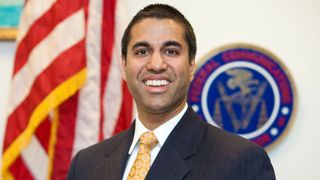FCC's Pai: U.S. Will Lead Way in 5G Deployment

In what he conceded was an unusual appearance by an FCC chair, Ajit Pai told the Council on Foreign Relations in New York Tuesday (Nov. 5) that it was "extraordinary times" that prompted the appearance, specifically the advent of an internet of things world and the importance of securing the wireless 5G nets that will connect them.
Pai asserted that the U.S. was poised to seize the high ground, in part thanks to the FCC's plan to "ensure that our nation leads the way in 5G deployment."
That appearance came even as tech advisory firm ABI Research was predicting China would far outstrip the U.S. in connections--to be fair it has a lot more people to connect--and at a 5G conference in D.C. co-sponsored by the Department of Homeland Security, one telecom attorney was saying the focus on winning such a race was a bit of a red herring.
But Pai was taking a holistic view of victory. "At the FCC, we’re implementing a plan to Facilitate America’s Superiority in 5G Technology. The 5G FAST Plan is already helping ensure that our nation leads the way in 5G deployment. We’re making more spectrum available for 5G. We’re making it easier for carriers to deploy wireless infrastructure. And we’re modernizing our rules to encourage the deployment of fiber to carry wireless traffic once it comes off the airwaves."
On the security issue, which was the focus of Pai's remarks, the chairman targeted Huawei, the Chinese telecom that is the largest supplier of the equipment at the heart of 5G technology.
"If China is willing to use its leverage over basketball, e-sports, and emojis, imagine what could happen if we let Chinese companies’ equipment into tomorrow’s 5G wireless networks," he said. "This would open the door to surveillance, espionage, and other harms—stakes much higher than sports and entertainment."
Pai used the opportunity to promote the FCC's upcoming vote on his proposal to prevent any of the $8.5 billion in Universal Service Fund broadband subsidy money to be spent on Huawei equipment and an accompanying inquiry into how best to rip and replace equipment already in networks.
Broadcasting & Cable Newsletter
The smarter way to stay on top of broadcasting and cable industry. Sign up below
Related: Hill Bill Would Help Fund Huawei Rip-and-Replace
Pai said those are two things that need to happen, but a third is to continue to engage with international partners--specifically ones that are still building out networks with Huawei and other suspect tech. "We need to remind our allies that decisions impacting 5G security need to be made with the long term in mind," he said. "Focusing too heavily on short-term considerations could result in choices that are penny wise but dollar foolish."
The chairman signaled there had been progress on that front.
"Having spent the past week meeting with other government officials at the World Radiocommunication Conference in Egypt, I’m encouraged that these principles are gaining traction. There’s growing awareness of the importance of supply chain integrity," he said. "Indeed, in the last twelve months, we’ve seen allies like Japan, Australia, and New Zealand take action to prevent equipment from unsafe vendors into their networks.
Related: Chinese Telecoms Unwanted in Government Contracts
Pai also said a fourth way to protect networks is to "virtualize" them, which means doing more with the software that the U.S. dominates in, rather than the tech over which China holds sway.
"If we can virtualize functions of the radio access network, we can not only reduce the cost of deploying 5G networks but reduce reliance on foreign equipment manufacturers," he said. "I am encouraged by the work that American companies are currently doing in this area and hope to see significant breakthroughs soon."
Democratic FCC commissioner Jessica Rosenworcel has also been pushing for moving the networks toward software-based command and control. "We need to be mindful that in a global economy, our networks will still connect to insecure equipment abroad," she said in a statement on the release of the USF fund item. "So, we should start researching how we can build networks that can withstand connection to equipment vulnerabilities around the world, including virtualizing the radio access part of our networks.”
Contributing editor John Eggerton has been an editor and/or writer on media regulation, legislation and policy for over four decades, including covering the FCC, FTC, Congress, the major media trade associations, and the federal courts. In addition to Multichannel News and Broadcasting + Cable, his work has appeared in Radio World, TV Technology, TV Fax, This Week in Consumer Electronics, Variety and the Encyclopedia Britannica.

